#easytense
Video
youtube
Reported Speech Video explained!
#Grammar#Easy#Easytense#English#ReportedSpeech#tips#CollectionOfGrammarTips#PeterandMel#Video#YouTube
1 note
·
View note
Photo
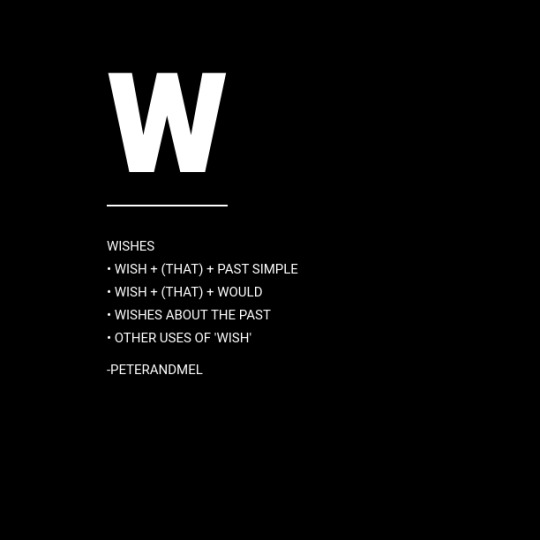
Uses
We can use 'wish' to talk about something that we would like to be different in the present or the future. It's used for things which are impossible or very unlikely.
We also use 'wish' with 'could' to talk about things in the present or future that we would like to be different. In this situation, 'could' is the past simple of 'can'.
Try this exercise: http://www.perfect-english-grammar.com/wish-exercise-1.html
We don't usually use 'wish' in this way for things that are really possible in the future. Instead, we use 'hope'
Wish + (that) + would:
On the other hand, we use 'would' with 'wish' in a little bit of a special way. It's generally used about other people who are doing (or not doing) something that we don't like and we want that person to change. It's not usually used about ourselves, or about something which nobody can change though, exceptionally, we do use it about the weather.
We don't usually use 'would' when there's no feeling that we want somebody to change their behaviour.
Wish + (that) + past perfect
We can use 'wish' with the past perfect to talk about regrets from the past. These are things that have already happened but we wish they'd happened in a different way. This use of 'wish' is very similar to the third conditional.
Wish + to + infinitive
We can use 'wish' with the infinitive to mean 'would like'. This is very formal. We don't usually use a continuous tense with 'wish' in this case.
Wish + object + to + infinitive
In the same way, we can use 'wish' with an object and an infinitive.
Wish + somebody + something:
This is used mostly in set phrases.
Here is even more practice for you: http://www.grammar-quizzes.com/condition4a.html
1 note
·
View note
Text
Conditionals
An intensive review about Conditionals -Real and Unnreal-, all explained and more practice for you! Click at this link and you will see it: http://www.englishpage.com/conditional/conditionalintro.html
0 notes
Photo
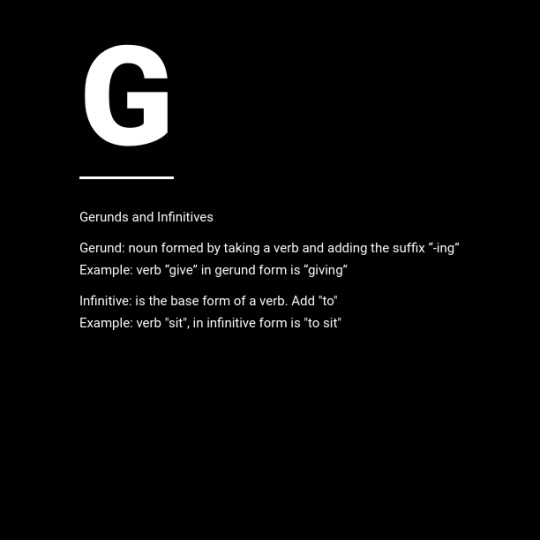
Gerund: Add and “ing” to the end of any verb
Infinitive: Add and “to” before the verb
Uses
Both gerunds and infinitives can be used as the subject or the complement of a sentence. However, as subjects or complements, gerunds usually sound more like normal, spoken English, whereas infinitives sound more abstract. In the following sentences, gerunds sound more natural and would be more common in everyday English. Infinitives emphasize the possibility or potential for something and sound more philosophical. If this sounds confusing, just remember that 90% of the time, you will use a gerund as the subject or complement of a sentence
As the object of a sentence, it is more difficult to choose between a gerund or an infinitive. In such situations, gerunds and infinitives are not normally interchangeable. Usually, the main verb in the sentence determines whether you use a gerund or an infinitive.
Some verbs are followed by gerunds as objects. Click at this link to see the list: http://www.englishpage.com/gerunds/gerund_list.htm
Some verbs are followed by infinitives. Click at this link to see the list: http://www.englishpage.com/gerunds/infinitive_list.htm
Gerunds can often be modified with possessive forms such as his, her, its, your, their, our, John's, Mary's, the machine's, and so on. This makes it clearer who or what is performing the action
Some verbs are followed by a noun plus an infinitive. In some situations, the noun is required. In other situations, the noun is optional. Click at this link to see the list: http://www.englishpage.com/gerunds/verb_noun_infinitive_list.htm
Some verbs are usually followed by a gerund, BUT they can also be followed by a noun plus infinitive. Using a noun plus infinitive will usually change who is performing the action. Click at this link to see the list: http://www.englishpage.com/gerunds/gerund_or_noun_infinitive_list.htm
There are many "go + gerund" expressions used for adventure sports and individual recreational activities. Click at this link to see the list: http://www.englishpage.com/gerunds/go_gerund.htm
Gerunds are used after prepositions. Most commonly, these are "verb + preposition" combinations. For reference, see the Verb + Preposition Dictionary and thePhrasal Verb Dictionary (click at the link). You don't have to memorize these resources, you just need to remember that gerunds are used after prepositions!
Remember that there are many "adjective + preposition" combinations and "noun + preposition" combinations in English as well. These are also followed by gerunds.List of Adjective + Preposition Combinations Followed by Gerunds and List of Noun + Preposition Combinations Followed by Gerunds. Once again, you don't have to memorize these resources, you just need to remember that gerunds are used after prepositions!
For Practice, link this page: http://www.englishpage.com/gerunds/index.htm
1 note
·
View note
Text
Passive Voice with Modals
A quick review about Passive Voice with Modals, with explanation and exercises for practice. Click at the link: http://www.grammarbank.com/passives-with-modals.html
0 notes
Text
Present Perfect Passive
A quick review about Present Perfect Passive, with explanation and exercises for practice. Click at the link: http://www.grammarbank.com/present-perfect-passive.html
0 notes
Text
Going To Future Passive
A quick review about Going To Future Passive, with explanation and exercises for practice. Click at the link: http://www.grammarbank.com/going-to-future-passive.html
0 notes
Text
Simple Future Passive
A quick review about Simple Future Passive, with explanation and exercises for practice. Click at the link: http://www.grammarbank.com/simple-future-passive.html
0 notes
Text
Past Continuous Passive
A quick review about Past Continuous Passive, with explanation and exercises for practice. Click at the link: http://www.grammarbank.com/past-continuous-passive.html
0 notes
Text
Present Progressive Passive
A quick review about Present Progressive Passive, with explanation and exercises for practice. Click at the link: http://www.grammarbank.com/present-continuous-passive.html
0 notes
Text
Simple Past Passive
A quick review about Simple Past Passive, with explanation and exercises for practice. Click at the link: http://www.grammarbank.com/simple-past-passive.html
0 notes
Text
Simple Present Passive
A quick review about Simple Present Passive, with explanation and exercises for practice. Click at the link: http://www.grammarbank.com/simple-present-passive.html
0 notes
Photo
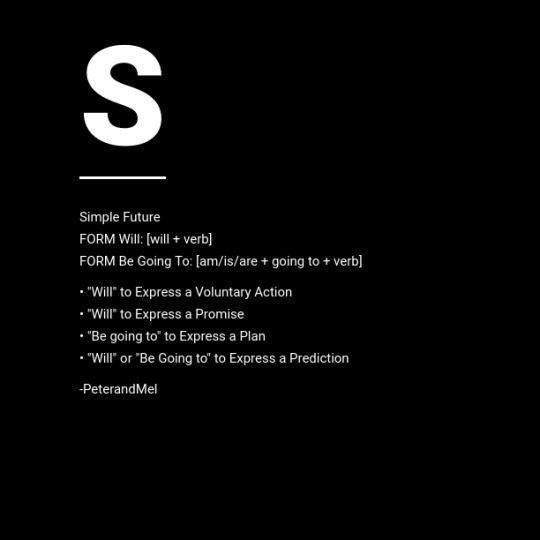
FORM Will: [will + verb]
Example: You will help him later.
FORM Be Going To: [am/is/are + going to + verb]
Example: You are going to meet Jane tonight.
Uses
"Will" to Express a Voluntary Action: "Will" often suggests that a speaker will do something voluntarily. A voluntary action is one the speaker offers to do for someone else. Often, we use "will" to respond to someone else's complaint or request for help. We also use "will" when we request that someone help us or volunteer to do something for us. Similarly, we use "will not" or "won't" when we refuse to voluntarily do something.
"Will" to Express a Promise: "Will" is usually used in promises.
"Be going to" to Express a Plan: "Be going to" expresses that something is a plan. It expresses the idea that a person intends to do something in the future. It does not matter whether the plan is realistic or not.
"Will" or "Be Going to" to Express a Prediction: Both "will" and "be going to" can express the idea of a general prediction about the future. Predictions are guesses about what might happen in the future. In "prediction" sentences, the subject usually has little control over the future and therefore USES 1-3 do not apply. In the following examples, there is no difference in meaning.
IMPORTANT: In the Simple Future, it is not always clear which USE the speaker has in mind. Often, there is more than one way to interpret a sentence's meaning.
1 note
·
View note
Photo
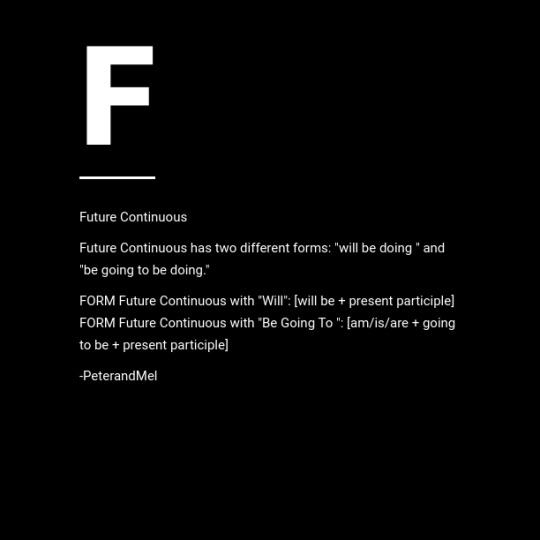
FORM Future Continuous with "Will": [will be + present participle]
Example: You will be waiting for her when her plane arrives tonight.
FORM Future Continuous with "Be Going To": [am/is/are + going to be + present participle]
Example: You are going to be waiting for her when her plane arrives tonight.
REMEMBER: It is possible to use either "will" or "be going to" to create the Future Continuous with little difference in meaning
Uses
Interrupted Action in the Future: Use the Future Continuous to indicate that a longer action in the future will be interrupted by a shorter action in the future. Remember this can be a real interruption or just an interruption in time.
Specific Time as an Interruption in the Future: In USE 1, described above, the Future Continuous is interrupted by a short action in the future. In addition to using short actions as interruptions, you can also use a specific time as an interruption.
Parallel Actions in the Future: When you use the Future Continuous with two actions in the same sentence, it expresses the idea that both actions will be happening at the same time. The actions are parallel.
Atmosphere in the Future: In English, we often use a series of Parallel Actions to describe atmosphere at a specific point in the future.
REMEMBER: In the Simple Future, a specific time is used to show the time an action will begin or end. In the Future Continuous, a specific time interrupts the action.
REMEMBER No Future in Time Clauses: Like all future tenses, the Future Continuous cannot be used in clauses beginning with time expressions such as: when, while, before, after, by the time, as soon as, if, unless, etc. Instead of Future Continuous, Present Continuous is used.
For more info, click here: http://www.englishpage.com/verbpage/futurecontinuousforms.htm
1 note
·
View note
Photo
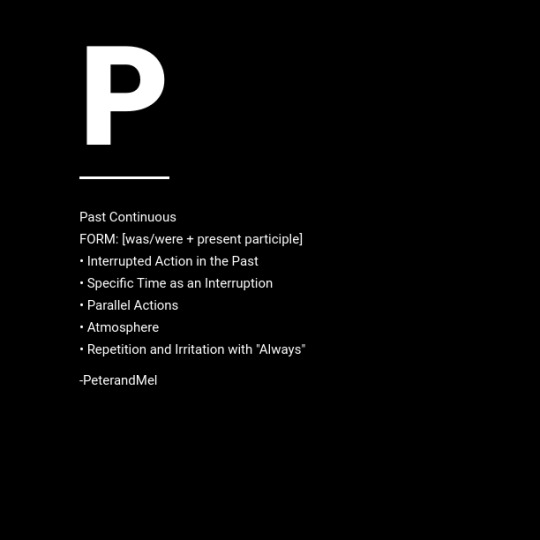
FORM: [was/were + present participle]
Example: You were studying when she called.
Uses:
Interrupted Action in the Past: Use the Past Continuous to indicate that a longer action in the past was interrupted. The interruption is usually a shorter action in the Simple Past. Remember this can be a real interruption or just an interruption in time. Specific
Time as an Interruption: In USE 1, described above, the Past Continuous is interrupted by a shorter action in the Simple Past. However, you can also use a specific time as an interruption.
Parallel Actions: When you use the Past Continuous with two actions in the same sentence, it expresses the idea that both actions were happening at the same time. The actions are parallel.
Atmosphere: In English, we often use a series of parallel actions to describe the atmosphere at a particular time in the past.
Repetition and Irritation with "Always": The Past Continuous with words such as "always" or "constantly" expresses the idea that something irritating or shocking often happened in the past. The concept is very similar to the expression "used to" but with negative emotion. Remember to put the words "always" or "constantly" between "be" and "verb+ing."
IMPORTANT: When you use the Past Continuous with two actions in the same sentence, it expresses the idea that both actions were happening at the same time. The actions are parallel.
1 note
·
View note
Photo
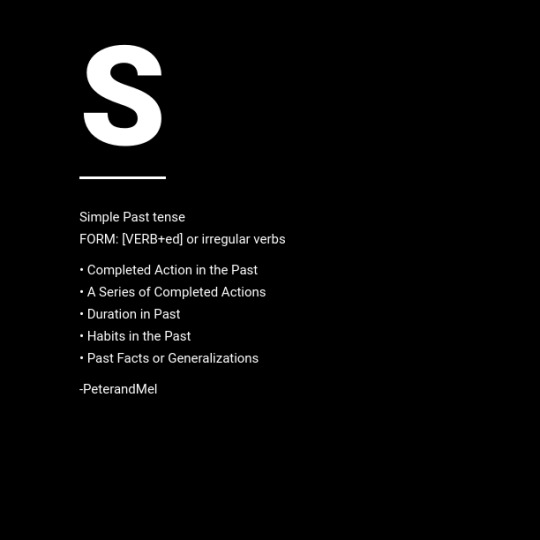
FORM: [VERB+ed] or irregular verbs
Example: You called Debbie.
Uses
Completed Action in the Past: Use the Simple Past to express the idea that an action started and finished at a specific time in the past. Sometimes, the speaker may not actually mention the specific time, but they do have one specific time in mind.
A Series of Completed Actions: We use the Simple Past to list a series of completed actions in the past. These actions happen 1st, 2nd, 3rd, 4th, and so on.
Duration in Past: The Simple Past can be used with a duration which starts and stops in the past. A duration is a longer action often indicated by expressions such as: for two years, for five minutes, all day, all year, etc
Habits in the Past: The Simple Past can also be used to describe a habit which stopped in the past. It can have the same meaning as "used to." To make it clear that we are talking about a habit, we often add expressions such as: always, often, usually, never, when I was a child, when I was younger, etc.
Past Facts or Generalizations: The Simple Past can also be used to describe past facts or generalizations which are no longer true. As in USE 4 above, this use of the Simple Past is quite similar to the expression "used to." (look at the link!)
IMPORTANT When-Clauses Happen First: Clauses are groups of words which have meaning but are often not complete sentences. Some clauses begin with the word "when" such as "when I dropped my pen..." or "when class began..." These clauses are called when-clauses, and they are very important. The examples below contain when-clauses.
0 notes